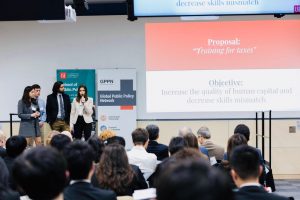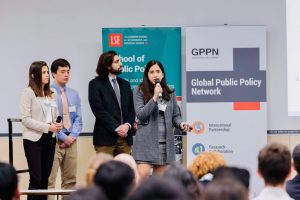This blog article has been submitted by one of the LSE teams that participated in the 2020 Global Public Policy Network (GPPN) competition.
Are Peruvian youth prepared to enter the labour market?
Over the last 25 years, the Peruvian government has made substantial efforts to expand access to tertiary education. During this period, the number of institutions grew by 57%; however, evidence shows that this massive and rapid expansion led to a decrease in the quality by 30% (Lavado, Yamada & Martínez, 2014). Tertiary education institutes are not preparing students with the practical skills demanded by the labour market, affecting primarily low-income students who disproportionately attend low-quality institutions. Therefore, 68% of graduates from technical institutes (similar to TVET 2-year colleges in the UK) do not find jobs according to their education level and have to work in positions that do not require tertiary education. Furthermore, the percentage of youth working in a job related to their field of study is 20% lower for students from low socio-economic backgrounds than from higher socio-economic levels, heightening existing inequalities (Urrutia & Cuenca, 2018).
In 2014, the government took action by creating the University Education Superintendency (SUNEDU), a supervisory agency that certifies the relevance and adequacy of tertiary education institutions through an accreditation system. However, the challenge to improve Peru’s human capital remains, and new schemes to provide higher quality technical training and re-skilling are needed. The role of private firms to tackle this problem is fundamental since they are the most informed about the skills required in their sectors. Furthermore, they are also negatively affected by the low human capital of the labour force. In 2018, 54% of large firms reported that they could not find qualified applicants to fill their positions and they identified the lack of technical skills as the main problem, (38.7%), before lack of experience (27%). (MANPOWER, 2018; MTPE, 2018). These findings evidenced a skills mismatch in Peru’s labour market that has significant implications for youth underemployment, personal development, workers efficiency and ultimately translates into unequal access to opportunities.

How can we reduce the gap between supply and demand of qualified professionals?
Based on the evidence shown, our proposal “Training for Taxes” scheme aims to incentivize private firms to contribute to increase the quality of human capital and decrease the skills mismatch in Peru’s labour market. This policy will be a tax deduction mechanism for firms that provide training programs to low-income students from technical institutes across the country. Our proposal stems from the availability of the “Works for Taxes” policy in Peru through which large firms can deduct up to 50% of the income tax on infrastructure projects, usually education or health facilities. Thus, we propose to allocate 15% of the deduction towards technical training programs. The government will deduct taxes based on three criteria: the students profile, hours of training and the percentage of students offered internships after the program.
Under this scheme, private companies will design the content of the training programs and implement the workshops in partnership with accredited education institutions, while adhering to the requirements established by the Ministries’ of Education and Labor. This regulation will ensure that not only job-specific skills are being taught but also transferable soft skills, such as leadership, teamwork, and verbal fluency (World Economic Forum, 2018). The Ministry of Education will match private firms with a pool of students from technical institutes studying a career relevant to their industry. This is done to ensure that disadvantaged students benefit from the training and firms are not only choosing high-skilled candidates from top institutions. Training programs would take place either on the firms’ facilities or on the partner educational institutions, depending on the programs’ content and technical equipment needs.
What will be the benefits for the stakeholders involved?
One of the most attractive features of this scheme for the national government is that it is fiscally neutral since the maximum tax deduction rate is already established in Peru’s legal framework. Furthermore, they would benefit from higher productivity and efficiency in the labour market. Private firms would be incentivized to participate to identify potential qualified candidates to fill their roles. Also, they could promote the training programs as corporate social responsibility initiatives to meet their targets. Low-income students would be motivated to receive the training to have more opportunities to access a job according to their education level. Finally, SUNEDU and the Ministry of Education will oversee the programs’ content, and they will learn how to upgrade the tertiary education curriculum based on market needs.

Have other countries adopted similar schemes?
It is also relevant to point out that similar schemes in Chile and Malaysia have shown positive impacts on employability and wages. In the case of Chile, the government set up a system to train current and potential employees through tax deductions, called SENCE Franquicia Tributaria. Trainees showed an increase in salary of 10% and an increase in employability of 8% (Mardones & Sepúlveda, 2017). On the other hand, impact evaluations of the Human Resource Development Fund in Malaysia reported an increase of 3.2% and 1.5% in the variables mentioned before (PSMB, 2018).
What are the expected socio-economic impacts?
The expected socio-economic impacts of the scheme are to correct the skills mismatch and reduce the gap between the supply and demand of qualified workers in the labour market. The training programs would increase the quality of human capital in Peru since students would acquire technical and soft skills. Thus, young professionals will find jobs according to their skill level, and underemployment would be reduced. These factors would lead to an increase in productivity both at individual and firm-level. Thus, Peru’s low-income youth would be better prepared to enter the labour market, reducing inequalities of opportunities and ensuring Peru’s sustainable growth in the long-run.

References:
- Corporate Strategy and Insights Department of Pembangunan Sumber Manusia Berhad (PSMB) (2018). Training Incentives for Malaysian SMEs: an Impact Evaluation. International Journal of HRD Practice, Policy and Research, Vol 3 No 1: 73-88.
- Lavado, P., Yamada, G. y Martínez J. (2014). ¿Una promesa incumplida? La calidad de la educación superior universitaria y el subempleo profesional en el Perú. Documento de Trabajo 2014-021. Banco Central de Reserva del Perú.
- Mardones, C. & Sepúlveda, L. (2017). Ex-post evaluation of tax credit known as ´franquicia SENCE’ for labor training and its effect on Chilean firms. University ICESI.
- MANPOWER (2018). Resolviendo la Escasez de Talento. Construir, Adquirir, Tomar prestado y Tender puentes. Encuesta de Escasez de Talento – Perú.
- Ministerio de Trabajo y Promoción del Empleo (2018). Brechas de habilidades y dificultades de la Demanda Laboral. Lima: MTPE. (Documento Técnica, Dirección General de Formación Profesional y Capacitación Laboral).
- Urrutia, C.E. & Cuenca. R (2018). Las desigualdades laborales que enfrentan los jóvenes de Lima Metropolitana. Lima: IEP. (Documento de Trabajo, 252. Estudios sobre Desarrollo, 28).
- World Economic Forum (2018). The future of job reports. Centre for the Economy and Society.


